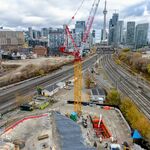jje1000
Senior Member
More bad news for Ontario (and the rest of Canada outside the Prairies).
Wynne or no Wynne, Ontario has some serious structural issues that it needs to deal with- and it will need to navigate an economy that's increasingly divided between the resource and service sectors. Truly the dutch disease people have speculated about.
http://www.theglobeandmail.com/repo...s-to-71-as-jobs-market-limps/article19562032/
Wynne or no Wynne, Ontario has some serious structural issues that it needs to deal with- and it will need to navigate an economy that's increasingly divided between the resource and service sectors. Truly the dutch disease people have speculated about.
Unemployment rate climbs to 7.1% as Ontario hit hard
MICHAEL BABAD
The Globe and Mail
Published Friday, Jul. 11 2014, 8:38 AM EDT
Canada’s labour market is limping badly, with the jobless rate now at 7.1 per cent and the slowest annual employment growth in more than four years.
The economy shed 9,400 jobs in June and the unemployment rate inched up from 7 per cent in May, Statistics Canada said Friday in a largely disappointing report that flew in the face of projects from economists, who had expected to see job creation of some 20,000.
Still, buried beneath the headlines was some good news: Employers added 33,500 full-time jobs in June, though that was eclipsed by the loss of 43,000 part-time positions. And over the course of the year, all job gains have been in the private sector.
The country’s labour market has been limping for some time now, with job-creation over the past year of just 72,000, or 0.4 per cent.
“This was the lowest year-over-year growth rate since February 2010, when year-over-year employment growth resumed following the 2008-2009 labour market downturn,” the federal statistics agency said.
Canada’s labour market readings have raised eyebrows among economists because of their volatility, which is why observers favour a longer-term trend. And that trend is not encouraging.
“In light of this volatility, it’s best to look at the six-month moving average for a more-reliable picture of the Canadian labour market,” said senior economist Krishen Rangasamy of National Bank.
“On that measure, Canada is creating on average roughly 9,000/month, mostly self-employed and in government, i.e. not a stellar performance by any means,” he added.
Jobs were lost in agriculture and manufacturing, though construction gained by almost 32,000.
The employment-to-population ratio, or the number of people working as a percentage of the adult population, inched down to 61.4 per cent from 61.5 per cent, continuing a troubling trend. It now stands just a shade over the low point hit late in the recession, noted chief economist Douglas Porter of BMO Nesbitt Burns.
Ontario, which lost 34,000 jobs last month, was a sore spot in the report, adding to the pressure on the recently re-elected government of Liberal Premier Kathleen Wynne.
“Gains in the West were more than offset by the sharp decline in Ontario, the latter province’s employment now about the same as at the start of the year,” noted Mr. Rangasamy.
Manufacturing in Ontario, which lost another 13,600 jobs, is now at its lowest point on records dating back to 1976, Mr. Porter noted.
Alberta, the heart of the oil industry and Canada’s jobs engine, gained 9,400 jobs.
“Annual employment in the province is now 3.5 per cent year over year, or miles above the 0.4-per-cent year-over-year national rate,” Mr. Porter said of the western province.
“If Alberta is stripped out of the national total, there would have been no job growth in the past year.”
The report knocked down the Canadian dollar, given how it will affect the Bank of Canada’s outlook.
“Today’s disappointing results will give the Bank of Canada more reasons to stay on their dovish script when they make their announcement next Wednesday, with their preference for a neutral stance on rate hikes to be maintained, despite accelerating inflation readings,” said Nick Exarhos of CIBC World Markets.
http://www.theglobeandmail.com/repo...s-to-71-as-jobs-market-limps/article19562032/
Last edited:




